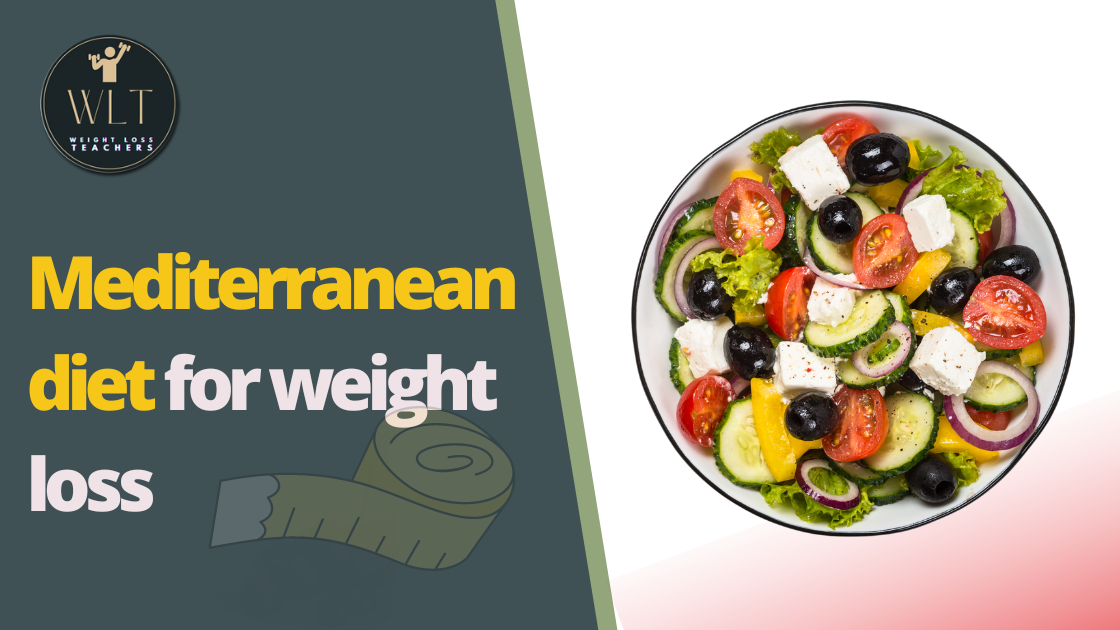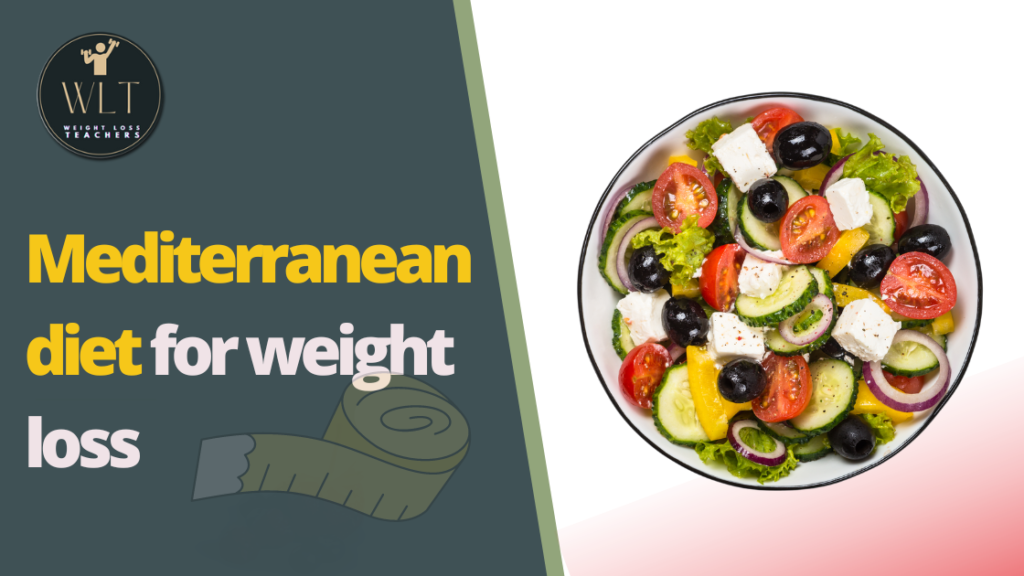
Mediterranean diet for weight loss

When it comes to weight loss, the options can seem overwhelming. With countless diets and approaches out there, it can be challenging to find a plan that is both effective and sustainable. However, one approach that has gained a lot of attention in recent years is the Mediterranean diet.
Table of Contents
Introduction
The Mediterranean diet is not just a weight-loss plan but a lifestyle that emphasizes fresh, whole foods, and healthy fats. In this article, we’ll explore the basics of the Mediterranean diet and how it can help you shed pounds while enjoying delicious, nutritious meals.

Mediterranean Diet for Weight Loss
What is the Mediterranean Diet?

The Mediterranean diet is based on the eating patterns of people in countries such as Greece, Italy, and Spain. These regions have long been associated with lower rates of heart disease and other chronic conditions. The traditional Mediterranean diet includes a wide variety of foods, such as plenty of fruits and vegetables, whole grains, legumes, nuts and seeds, olive oil as the primary source of fat, moderate amounts of fish and seafood, small amounts of dairy and red meat, and limited amounts of processed foods and sweets.
The Mediterranean diet is rich in healthy fats, such as monounsaturated and polyunsaturated fats found in olive oil, nuts, and fish. These fats have been shown to have numerous health benefits, including a lower risk of heart disease and other chronic diseases. The diet is also high in fiber and antioxidants, which have been shown to promote weight loss and improve overall health.
How Does the Mediterranean Diet Promote Weight Loss?

The Mediterranean diet promotes weight loss in several ways. First and foremost, it emphasizes whole, nutrient-dense foods that are naturally low in calories. These foods are rich in vitamins, minerals, and antioxidants while being relatively low in energy density. By including these foods in your diet, you can feel satisfied and full while consuming fewer calories overall.
Second, the Mediterranean diet is high in healthy fats, which can help regulate appetite and promote feelings of fullness. Fat takes longer to digest than carbohydrates, which means it can help keep you satisfied for longer periods. This can reduce the likelihood of overeating or snacking between meals.
Finally, the Mediterranean diet is rich in fiber, which is essential for maintaining a healthy weight. Fiber helps slow down digestion, keeping you feeling fuller for longer and reducing cravings. It also aids in proper digestion and promotes regular bowel movements.
Scientific studies have consistently shown the effectiveness of the Mediterranean diet for weight loss. In one study, overweight and obese adults who followed the Mediterranean diet lost more weight and experienced greater improvements in body composition compared to those who followed a low-fat diet. Another study focused on women and found that those who followed the Mediterranean diet for 12 months lost more weight and showed greater improvements in insulin sensitivity compared to those who followed a low-fat diet.
Tips for Following the Mediterranean Diet for Weight Loss

If you’re interested in trying the Mediterranean diet for weight loss, here are some tips to get started:
- Focus on whole, nutrient-dense foods:
Emphasize fruits, vegetables, whole grains, legumes, nuts, and seeds in your meals. These foods provide essential nutrients while keeping calorie intake in check.
- Use healthy fats:
Make olive oil your primary source of fat, and include fatty fish (such as salmon) in your diet. These healthy fats provide important omega-3 fatty acids and contribute to a feeling of fullness.
- Limit processed foods:
Processed foods and sweets should be avoided as much as possible. These foods are typically high in added sugars, unhealthy fats, and empty calories. Instead, opt for homemade meals using fresh, whole ingredients.
- Enjoy moderate amounts of dairy and red meat:
While dairy and red meat are not off-limits on the Mediterranean diet, they should be consumed in moderation. Choose lean cuts of meat and opt for low-fat dairy options.
- Be mindful of portion sizes:
Even healthy foods can contribute to weight gain if consumed in large amounts. Pay attention to your portion sizes and aim to eat until you feel satisfied, not stuffed. Practice mindful eating by savoring each bite and listening to your body’s hunger and fullness cues.
- Stay active:
Regular physical activity is essential for weight loss and overall health. Aim for at least 30 minutes of moderate exercise most days of the week. Find activities you enjoy, such as walking, swimming, or dancing, to make it a sustainable part of your lifestyle.
Side Effects of the Mediterranean Diet

The Mediterranean diet is generally considered a healthy and well-balanced eating plan. However, it’s important to note that individual experiences may vary, and there can be some potential side effects associated with this diet. Here are a few things to be aware of:
- Weight loss plateau:
While the Mediterranean diet has been shown to be effective for weight loss, some individuals may experience a plateau where their weight loss slows down or halts. This can be frustrating, but it’s important to remember that weight loss is not always linear. To overcome a plateau, it may be necessary to adjust portion sizes, increase physical activity, or seek guidance from a healthcare professional or registered dietitian.
- Nutrient deficiencies:
While the Mediterranean diet is rich in many essential nutrients, there is a possibility of certain deficiencies if the diet is not well-planned or if individuals have specific dietary restrictions or medical conditions. For example, individuals who exclude certain food groups, such as dairy or seafood, may need to find alternative sources of calcium or omega-3 fatty acids. Consulting with a healthcare professional or registered dietitian can help ensure that nutrient needs are met.
- Digestive issues:
The Mediterranean diet is high in fiber due to its emphasis on whole grains, fruits, vegetables, and legumes. While fiber is important for digestive health, some individuals may experience digestive issues such as bloating, gas, or changes in bowel movements when significantly increasing their fiber intake. It’s recommended to gradually increase fiber intake and drink plenty of water to help prevent or alleviate these symptoms.
- Allergies or sensitivities:
Some individuals may have allergies or sensitivities to specific foods commonly included in the Mediterranean diet, such as seafood, nuts, or gluten-containing grains. It’s important to be mindful of any known allergies or sensitivities and make appropriate substitutions or modifications to ensure a safe and enjoyable eating experience.
- Individual differences:
Every person’s body is unique, and what works well for one individual may not work the same way for another. While the Mediterranean diet has been widely studied and shown to have numerous health benefits, it’s possible that some individuals may not respond favorably to certain aspects of the diet. Pay attention to your body’s response and make adjustments as needed to ensure optimal health and well-being.
Sample One-Week Mediterranean Diet Meal Plan

Here’s a sample one-week meal plan to give you an idea of what a Mediterranean diet could look like. Remember, you can customize this plan based on your preferences, dietary restrictions, and portion sizes.
Monday:
- Breakfast: Greek yogurt topped with fresh berries and a sprinkle of chopped almonds.
- Lunch: Whole grain salad with mixed greens, cherry tomatoes, cucumber, olives, feta cheese, and grilled chicken. Drizzle with olive oil and lemon juice.
- Snack: Carrot sticks with hummus.
- Dinner: Baked salmon seasoned with herbs and lemon, served with roasted vegetables (such as bell peppers, zucchini, and eggplant) and quinoa.
- Dessert: Fresh fruit salad.
Tuesday:
- Breakfast: Veggie omelet made with eggs, spinach, tomatoes, and feta cheese.
- Lunch: Whole wheat pita bread filled with grilled chicken, sliced tomatoes, cucumbers, and tzatziki sauce.
- Snack: Handful of mixed nuts.
- Dinner: Whole wheat pasta with sautéed shrimp, garlic, cherry tomatoes, and fresh basil. Drizzle with olive oil.
- Dessert: Greek yogurt with a drizzle of honey and a sprinkle of cinnamon.
Wednesday:
- Breakfast: Oatmeal topped with sliced bananas, chopped walnuts, and a drizzle of honey.
- Lunch: Quinoa salad with mixed greens, roasted vegetables, chickpeas, and crumbled feta cheese. Dress with olive oil and balsamic vinegar.
- Snack: Sliced cucumbers with tzatziki dip.
- Dinner: Grilled chicken breast with roasted sweet potatoes and steamed broccoli.
- Dessert: Baked apple slices with a sprinkle of cinnamon.
Thursday:
- Breakfast: Whole grain toast topped with mashed avocado, sliced tomatoes, and a poached egg.
- Lunch: Mediterranean-style wrap with whole wheat tortilla, grilled vegetables, hummus, and grilled chicken or tofu.
- Snack: Greek yogurt with a drizzle of honey and a handful of granola.
- Dinner: Baked cod with a tomato and olive salsa, served with quinoa and steamed asparagus.
- Dessert: Mixed berries with a dollop of Greek yogurt.
Friday:
- Breakfast: Spinach and feta cheese omelet with a side of whole grain toast.
- Lunch: Greek salad with mixed greens, cucumbers, tomatoes, red onions, Kalamata olives, and feta cheese. Drizzle with olive oil and lemon juice.
- Snack: Homemade trail mix with dried fruits and nuts.
- Dinner: Lentil soup with a side of whole grain bread and a green salad.
- Dessert: Baked pear with a drizzle of honey and a sprinkle of crushed pistachios.
Saturday:
- Breakfast: Overnight chia seed pudding made with almond milk, topped with fresh berries and a sprinkle of coconut flakes.
- Lunch: Whole grain couscous salad with diced vegetables, chickpeas, feta cheese, and a lemon-herb dressing.
- Snack: Sliced apples with almond butter.
- Dinner: Grilled shrimp skewers with a side of quinoa and grilled vegetables.
- Dessert: Dark chocolate squares with a handful of grapes.
Sunday:
- Breakfast: Whole grain pancakes topped with sliced peaches and a dollop of Greek yogurt.
- Lunch: Caprese salad with sliced tomatoes, fresh mozzarella cheese, basil leaves, and a drizzle of balsamic glaze.
- Snack: Roasted chickpeas.
- Dinner: Mediterranean-style stuffed bell peppers with ground turkey, quinoa, vegetables, and feta cheese.
- Dessert: Grilled pineapple with a sprinkle of cinnamon.
Remember to adapt the portion sizes and ingredients to meet your individual needs and goals. It’s also important to consult with a healthcare professional or registered dietitian before making any significant changes to your diet, especially if you have any underlying health conditions or specific dietary requirements.
Mediterranean Diet vs. Other Types of Diets: A Comparative Analysis

The Mediterranean diet is not just a diet but a way of life that is based on the traditional eating patterns of people in countries such as Greece, Italy, and Spain. It emphasizes whole, minimally processed foods, with an emphasis on fruits, vegetables, whole grains, legumes, nuts, and seeds. Olive oil is the primary source of fat, and moderate amounts of fish, seafood, dairy, and red meat are consumed. The Mediterranean diet is also known for its moderate intake of wine and its focus on enjoying meals in the company of others.
One of the key features of the Mediterranean diet is its emphasis on healthy fats, such as monounsaturated and polyunsaturated fats found in olive oil and fatty fish. These fats have been shown to have numerous health benefits, including reducing the risk of heart disease and improving overall cardiovascular health.
Note: There might be affiliate links mentioned here. We may receive a commission if you purchase a product through an affiliate link. There is no additional charge for you. Please do your own research before making any online purchases.
Other Types of Diets: A Variety of Approaches

There are several other popular diets that have gained attention for their potential health and weight loss benefits. Here are a few examples:
- Low-Carb Diets:
Low-carb diets restrict the intake of carbohydrates, such as grains, starchy vegetables, and sugary foods. These diets typically emphasize high protein and fat intake. Examples include the ketogenic diet and the Atkins diet.
- Paleo Diet:
The paleo diet is based on the idea of eating foods that our ancestors would have consumed during the Paleolithic era. It focuses on whole, unprocessed foods and eliminates grains, legumes, dairy, and processed foods.
- Vegan Diet:
A vegan diet excludes all animal products, including meat, dairy, eggs, and honey. It is typically rich in fruits, vegetables, whole grains, legumes, nuts, and seeds.
- DASH Diet:
The Dietary Approaches to Stop Hypertension DASH diet is specifically designed to lower blood pressure. It emphasizes fruits, vegetables, whole grains, lean proteins, and low-fat dairy products while limiting sodium, saturated fats, and added sugars.
Comparing the Mediterranean Diet to Other Diets

- Nutrient Profile:
The Mediterranean diet and other diets mentioned above can all provide essential nutrients when well-planned. However, the Mediterranean diet stands out for its emphasis on a wide variety of nutrient-dense foods, including fruits, vegetables, whole grains, and healthy fats. It is generally well-balanced and sustainable.
- Sustainability:
The Mediterranean diet offers a flexible and sustainable approach to eating. Its focus on fresh, whole foods and enjoyment of meals in a social setting promotes a positive relationship with food. This can lead to long-term adherence and better overall well-being.
- Weight Loss:
Research supports the effectiveness of the Mediterranean diet for weight loss. Studies have shown that the Mediterranean diet can lead to significant weight loss and improvements in body composition compared to other diets, including low-fat diets and low-carb diets. Its emphasis on satiating, nutrient-dense foods, healthy fats, and portion control may contribute to its weight loss benefits.
- Health Benefits:
The Mediterranean diet and other diets mentioned can all offer health benefits. However, the Mediterranean diet has been extensively studied and associated with a reduced risk of various chronic diseases, including heart disease, type 2 diabetes, certain cancers, and cognitive decline.
While there are several types of diets available, the Mediterranean diet stands out as a sustainable, well-rounded approach to eating. Its emphasis on whole, minimally processed foods, healthy fats, and moderate portions makes it suitable for long-term adherence and overall health. The Mediterranean diet has been extensively studied and associated with numerous health benefits, including weight loss, improved cardiovascular health, and a reduced risk of chronic diseases.
It’s important to note that individual needs and preferences may vary, and the most suitable diet will depend on factors such as personal health goals, cultural considerations, and individual tolerance. Consulting with a healthcare professional or registered dietitian can provide personalized guidance and support in choosing the most appropriate dietary approach for your specific needs.
Conclusion
The Mediterranean diet offers a delicious and healthy way to lose weight and improve your overall health. By focusing on whole, nutrient-dense foods and incorporating healthy fats, you can feel satisfied while shedding pounds. The Mediterranean diet is not a restrictive or short-term approach but rather a sustainable lifestyle that promotes long-term well-being. If you’re looking for a well-rounded and enjoyable way to achieve weight loss goals, the Mediterranean diet is certainly worth considering.
Disclaimer: The information provided in this article is for educational purposes only and should not be considered as a substitute for medical advice. Consult a healthcare professional before implementing any home remedies or making significant changes to your lifestyle.






